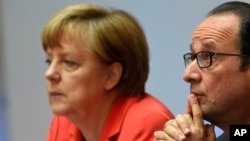German Chancellor Angela Merkel and French President Francois Hollande confirmed their commitment to fighting global warning Tuesday, gathering with others in Berlin to prepare for this year's U.N. Climate Change Conference.
Merkel and Hollande said in a joint statement that both countries "are firmly decided to take all efforts to reach an ambitious, comprehensive and binding U.N. climate agreement by the end of this year in Paris."
The preparatory talks in Berlin involve 35 countries. The Paris summit in December aims to curb climate change and rising global temperatures, which scientists say are largely driven by carbon emissions.
The European two leaders said they "are committed to the goal of limiting global temperature increases at least to below 2C compared with pre-industrial levels."
To achieve this goal, they said a fundamental shift of investment into low-carbon infrastructure and technologies is needed as well as climate-friendly land use.
They also said countries already threatened by "unavoidable risks and damage arising from climate change" need to be strengthened in their resilience.
Merkel has made climate protection one of the key goals of her political agenda, and Germany wants to focus on it at the G-7 summit next month in Bavaria. Under Merkel's lead, Germany began to phase out nuclear power after Japan's 2011 Fukushima disaster in Japan and has since then invested heavily in renewable energy.
For some critics, those reforms do not go far enough.
Activists from Greenpeace and other environmental groups protested Tuesday in Berlin, placing a model of Paris' Eiffel Tower converted into a wind turbine in front of the city's Brandenburg Gate. They demanded a faster energy transition away from nuclear power and coal and toward the use of 100 percent renewable energies by 2050.
The German government plan is one of the world's most ambitious, calling for renewable energies, including wind and sun, to make up 40 to 45 percent of Germany's energy mix by 2025, compared with just under a quarter now, and 55 to 60 percent by 2035.




